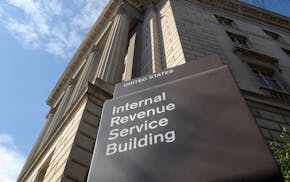Tonight's debate, the only one between the vice presidential candidates, will cover foreign as well as domestic policy. So we hope that Mitt Romney's running mate, U.S. Rep. Paul Ryan, might have a chance to start clarifying several positions that Romney laid out for a possible new Republican administration in a foreign-policy address at the Virginia Military Institute on Monday.
Continuing a welcome pattern begun at last week's debate with President Obama, Romney was more presidential in bearing and more moderate in tone than he had sometimes been earlier in his campaign. Still, more specifics are needed, especially regarding Romney's approach to the Mideast.
Speaking of Israel and the United States, Romney said, "The world must never see daylight between our two nations." Romney is right to stand stalwart with our ally. But because Israeli Prime Minister Benjamin Netanyahu has been so bellicose toward Iran -- which Israel rightly considers an existential threat due to its potential nuclear weapons program -- an utter lack of daylight might seem to increase the likelihood that America will be drawn into yet another major Mideast war.
"I will put the leaders of Iran on notice that the United States and our friends and allies will prevent them from acquiring nuclear weapons capability," Romney said, adding that he would "not hesitate to impose new sanctions on Iran, and will tighten the sanctions we already have." But the Obama administration has already rallied allies to impose extraordinary sanctions, which are having an extraordinary effect: Iran's currency has devalued by 40 percent, leading to social unrest. What new steps would a President Romney push? And, as important, what convinces him those steps would be backed by the needed "friends and allies"?
Similarly, a "no daylight" policy could complicate America's effort to be perceived as an honest broker between Israel and Palestine. It was encouraging to hear Romney reconfirm the bipartisan commitment to a two-state solution. But he may need to go further to make clear which Mitt Romney would govern: The pragmatist heard in Monday's speech, or the secretly recorded candidate who candidly dismissed the Palestinians as having "no interest whatsoever in establishing peace?"
Romney was both strategic and humane in describing the plight of Syrians rebelling against Syria's homicidal president, Bashar Assad. But Romney's call to arm the opposition needs many more details: Which rebels? And how will the heavy weaponry needed to "defeat Assad's tanks, helicopters and fighter jets" be kept out of the hands of extremists? Would the United States act unilaterally? Through NATO? Through multilateral institutions that Romney and Republicans have previously criticized?
Syria, of course, is just one of the many Mideast and North African nations undergoing Arab Spring transitions, in which repressive regimes are being replaced by emerging, messy democracies. In many nations, extremists have tried to hijack these rapid transformations, challenging not only the nascent replacement governments, but Western interests as well.
Romney criticized Obama's approach: "The greater tragedy of it all is that we are missing an historic opportunity to win new friends who share our values in the Middle East -- friends who are fighting for our own futures against the very same violent extremists, and evil tyrants, and angry mobs who seek to harm us." Romney needs to square those worthy words with his previous call to "zero out" foreign aid each year. Many new leaders will be far from ideal. But they are often among the more moderate voices in their countries, and U.S. aid used to strategically strengthen security services and establish democratic infrastructure can be an effective tool to keep extremists on the fringe.
More specificity is also required regarding Afghanistan. Romney has endorsed Obama's timetable to end combat operations by the end of 2014. But unlike Obama, Romney seems to leave room to extend the deadline: "I will evaluate conditions on the ground and weigh the best advice of our military commanders. And I will affirm that my duty is not my political prospects, but to the security of our nation." But corrosive corruption and a tragic lack of leadership from Afghan President Hamid Karzai mean that it's unlikely that any commander will report that Afghan security services will be ready. The nation deserves to know just how open-ended is Romney's willingness to extend our military involvement.
We share Romney's disappointment that the hard-fought gains in Iraq seem to be eroding, as its society reverts to sectarianism and its government drifts too close to Iran. But again, what would a Romney administration do about it?
Romney's overarching theme -- the continuing need for confident American leadership in world affairs, lest other nations that oppose our values and interests fill that role in our place -- has appeal. But only more clarity on his intentions will help Americans decide whether they share Romney's sense of the direction that leadership should take.
Readers Write: Politicized education, presidential debates, election strategies, small-town papers

Taxes increasingly paying for the past — not the future
!["Since the [Hennepin Healthcare System] Board took control in 2007, CEO pay increased by more than 142%. Meanwhile, that same board sunsetted employee](https://arc.stimg.co/startribunemedia/J7MD7DSJWMP3KYIYUSCQTABOAA.jpg?h=91&w=145&fit=crop&bg=999&crop=faces)

